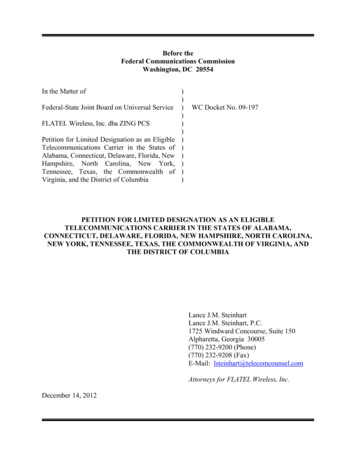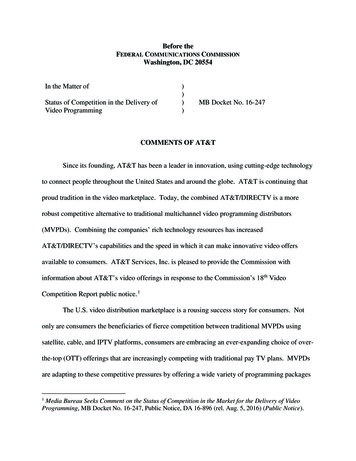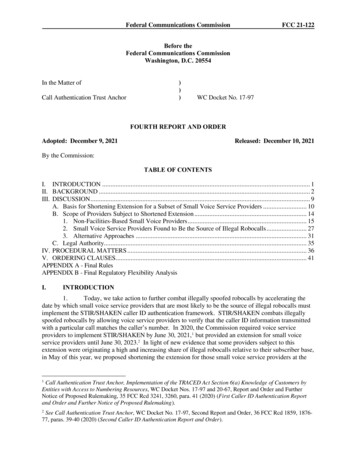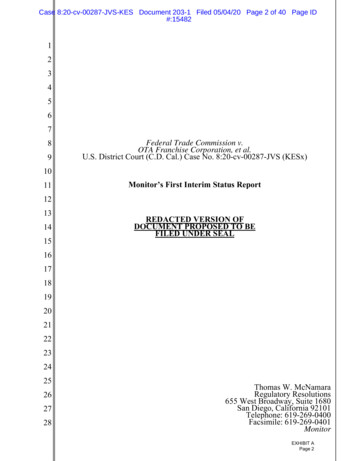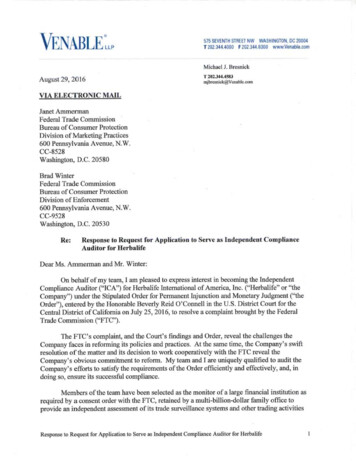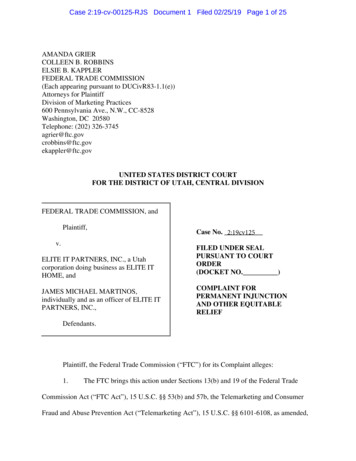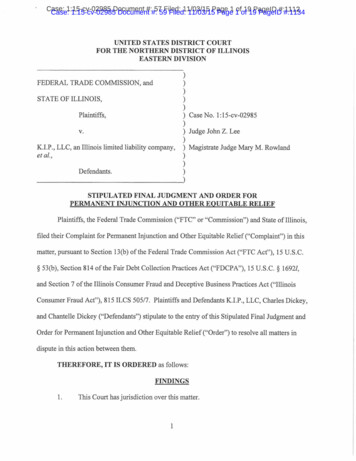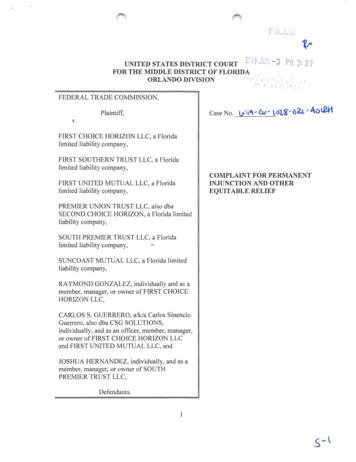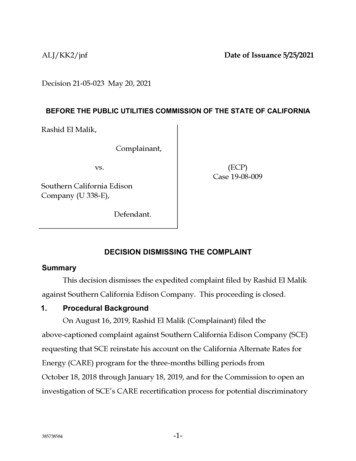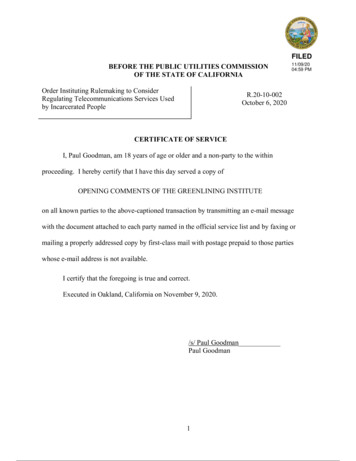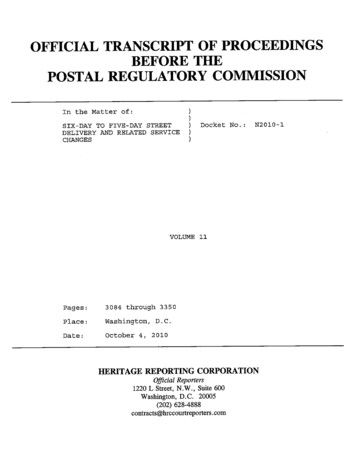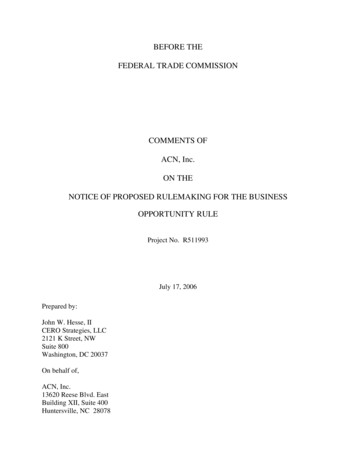
Transcription
BEFORE THEFEDERAL TRADE COMMISSIONCOMMENTS OFACN, Inc.ON THENOTICE OF PROPOSED RULEMAKING FOR THE BUSINESSOPPORTUNITY RULEProject No. R511993July 17, 2006Prepared by:John W. Hesse, IICERO Strategies, LLC2121 K Street, NWSuite 800Washington, DC 20037On behalf of,ACN, Inc.13620 Reese Blvd. EastBuilding XII, Suite 400Huntersville, NC 28078
ACN, Inc. (ACN) is pleased to have this opportunity to provide comments on the Notice ofProposed Rulemaking for the Business Opportunity Rule to the Federal Trade Commission (FTC)published in the Federal Register on April 12, 2006. ACN believes it critical to eliminate anyconfusion that might exist about legitimate direct selling companies. This set of commentsprovides an overview of: (1) ACN’s global activities; (2) ACN’s direct selling method; and (3)ACN’s specific observations with respect to the Notice of Proposed Rulemaking for the BusinessOpportunity Rule.1.Introduction to ACNACN is a global telecommunications company operating in 18 countries over 3 continents. Itbegan its business in the US in 1993 and by 2004, it had global revenues of approximately 500million, with its business growing at around 40% annually. Globally, ACBN is headquartered inNorth Carolina. Its North American Operations are directed from its offices in Michigan.Outside the US, it operates in 18 countries, typically through local operating companies, withregional headquarters in Amsterdam, The Netherlands and Sydney, Australia. A copy of ACN’sglobal corporate profile is enclosed.ACN’s business consists of reselling fixed telephone, mobile telephone and Internet services toresidential and small business customers. In order to serve its customers, of which there areapproximately 1.5 million worldwide, it has (wholesale) contracts in place with many of thelargest telecommunications operators globally, including British Telecom (BT), MCI, DeutscheTelecom and Telia Sonera. Moreover, ACN has over 1200 staff worldwide providing supportservices, including customer support, representative support, and marketing support and productand billing support.ACN uses a direct selling method of marketing whereby independent sales representativesemploy so-called “warm marketing”, i.e. sales representatives approach people on a person-toperson basis to ask whether they would like to purchase ACN telephony services. No massmarket advertising is used. Its model includes a multi-level marketing component (MLM) in thatsuch personal contacts, if interested, may also be invited to become representatives to sell ACNservices on the same basis. ACN currently has approximately 100,000 sales representativesworldwide, approximately 50,000 of whom are in the US.This MLM direct selling model enables ACN: (i) to reach telecommunications customers that arenot traditionally reached by other selling methods, thereby introducing further competition intothe market; (ii) to operate at substantially reduced customer acquisition costs in a low marginbusiness and thereby offer cheaper services to customers; (iii) to provide opportunities toindividuals to set up their own sales and marketing business, and (iv) to enable these individualsto sell a ‘product’, phone services, that because of infrastructure or back-office supportrequirements they could otherwise never sell on a smaller scale, because ACN acts as acentralized outsourced provider of that infrastructure and support.The corporate group of ACN is actively committed to complying with all applicable laws,including telecommunications regulations and consumer protection laws. We have compliancedepartments on each continent where ACN does business that work closely with our legal2
departments on compliance issues. The compliance department continually reviews theadherence of ACN’s 100,000 independent sales representatives to the terms of their independentsales agreements with the company and with all of ACN’s policies, procedures, compensationplans and, of course, applicable consumer protection laws. Working closely with ACN’s legaldepartment, ACN’s compliance department evaluates and disciplines every infraction detectedby the company, all with an eye towards making sure that ACN’s customers and futureindependent sales representatives are acquired by its representatives with the same integrity asthey would if recruited by the company directly. This effort ensures that all complaintsdiscovered by or brought to the company are addressed. Needless to say, these legal andcompliance expenses are substantial portions of ACN’s operating budget.In addition and singularly among direct selling companies, in the US, where ACN has beenestablished since 1993, it has a legal advisory board of three former state attorneys general, eachof whom, during his term in office, made overseeing enforcement of consumer protection laws atop priority. In addition to his credentials as a former attorney general, each of the individualsserving on ACN’s Legal Advisory Committee has a distinguished resume as an attorney, and in anumber of cases, as a judge. The Committee has but one goal for ACN, and that is to make sureACN and its independent representatives are acting within the law. The Committee achieves thisend using a number of methods. First, it serves an independent and objective review board forall of ACN’s independent representative-related materials, including ACN’s sales and marketingcollateral, its compensation plans, and its policies and procedures. Second, the Committeereviews routinely kept sales and other statistics on an at-least monthly basis, in an effort to detecttrends suggesting potential misbehavior on the part of ACN’s independent representatives. Third,the Committee works hand in hand with ACN’s internal compliance department to handle issuesof independent representative misbehavior that are detected. Finally, the Committee is the publicface of ACN’s legal department, and members of the Committee appear at each of ACN’sInternational Training Events, warning ACN’s independent representatives in attendance ofACN’s lack of tolerance for independent representatives who may flout corporate policies or thelaw.ACN pioneered the concept of its Legal Advisory Committee in the United States, ACN’s hometerritory. However, as ACN has expanded globally, the success of its US-based Committee hasled ACN to expand the Committee. Recently, ACN added a Canadian Committee member, inrecognition of ACN’s enlarging presence in that country. At present, ACN is in the process ofadding an Australian Committee member, and is actively searching for an appropriate EuropeanCommittee member. Each of these expansion members of the Committee brings to theCommittee the same highly respected consumer protection background as the Committee’soriginal three US members, and will serve in an identical capacity with a specific focus on hisregion.ACN is a member of the Direct Selling Association (DSA) in the US (its Executive VicePresident, David Merriman, is a member of the Board of Directors of the Association). It is alsoa member of the Direct Selling Association in a variety of European countries. It activelymonitors any legislation that might affect its activities. Its sales representatives’ materials andtraining seminars are directed at ensuring compliance in sales activities with the appropriate law.3
2.ACN’s Direct Selling Distribution SystemAn ACN sales representative will enter into an independent representative agreement whichregulates the terms under which the sales representative may market and promote ACN servicesand may sponsor further independent sales representatives, in accordance with ACN policies andpractices. For an initial fee, and subsequent annual renewal fee, the representative is givenaccess to ACN sales training, marketing, and back office support services, includingtelecommunications billing. The initial fee and renewal fees cover portions of the cost to ACNof operating these services.An ACN sales representative is entitled to receive: (i) a commission on the revenue generatedboth by customers recruited directly by the sales representative and by customers recruited bysales representatives he/she has recruited (“down line customers”) and/or (ii) certain bonuses forthe subscription to ACN services of both new customers recruited by the sales representative ornew “down line” customers. ACN sales representatives are not required to become ACNtelephony customers, nor are ACN telephony customers required to become ACN salesrepresentatives.Thus ACN sales representatives do not gain any revenue from signing up new salesrepresentatives. ACN sales representatives can only hope to generate income if they sell ACNtelephony services, not if they simply recruit additional ACN sale representatives. Indeed, theoverwhelming majority of ACN revenues are generated from billing and sales of telephonyservices to end customers. Only a small portion of those end customers are ACN salerepresentatives. A very small percentage of ACN’s revenue is derived from the entry andrenewal fee that ACN sales representatives pay to become part of the ACN sales network, andthat revenue amount is more than consumed by ACN’s costs in supporting the businesses of itsindependent representatives.The ACN marketing plan contrasts with illegal pyramid schemes in that revenue from illegalpyramid schemes derives primarily from the expansion of the sales network through paymentsby new entrants for participating in the scheme, rather than from the sales of real products and/orservices to consumers. In contrast, ACN’s business depends solely on its highly competitivesales of telephony services and on the acquisition of new customers at the expense of othertelecommunications companies.3.Specific Comments Regarding The Notice of Proposed Rulemaking on BusinessOpportunitiesAs a member of the Direct Selling Association, ACN wishes to echo the Association’s comments.The proposed rule as drafted would have a devastating effect on direct selling in the US. Wefully support the Commission’s purpose here, to reduce business opportunity fraud.Unfortunately, we do not believe that fraudulent actors will comply with any requirementproposed by the FTC. Consequently, the FTC must take into account the impact its proposedrule will have on legitimate businesses and impose minimal regulatory burdens.4
There is no need to repeat the concerns raised by the DSA as they properly reflect our ownanalysis of the effect the current form of the rule would have on direct selling. Generally, weconcur with the policy proposals suggested by the DSA and will actively support work toimplement them. We would, however, like to emphasize two aspects of the proposed rule thatare the most problematic and add a suggestion to the idea proposed by the DSA regarding formalrecognition of self-regulatory efforts.One of the most confusing and burdensome sections of the proposed rule is the seven-daywaiting period to enroll new independent sales representatives. Sections 437.2 is impractical andwill fundamentally and adversely alter the way in which our company operates. We understandthat the concept for this section is borrowed from the franchising regulations. Prospectivefranchisees understand that they are making a substantial investment. They are unlikely to beintimidated by procedural requirements. Direct sellers are not making a similarly substantialinvestment, which in fact is a primary attraction of pursuing a direct selling business opportunity.Direct sellers currently do not face any regulatory procedures to follow in order for them tobecome independent representatives, and were they to, such procedures would act as asubstantial disincentive when balanced against the relatively low initial investment. Additionally,unlike franchises, ACN complies with the FTC’s current three-day waiting period and furtherwill refund start-up costs for 10 days upon cancellation of the sales agreement by the salesperson.Essentially, ACN offers a ten day right of rescission. Furthermore, the number of cancellationrequests that we do receive is low. Therefore, we see only negative consequences to requiring awaiting period in the direct selling context, rather than any beneficial curing of a buyer’s remorsethat is not already achieved by the three-day cooling off period and ACN’s cancellation policy.Section 473.3 (6) of the proposed rule would require that each company maintain ageographically manageable, comprehensive database of individuals who have sold for it for thelast three years, including names, cities, states, and telephone numbers. The rule would requirethe disclosure of all of these individuals to prospective salespeople, or alternatively, that theidentities of ten geographically nearest purchasers be revealed to the prospect.This requirement violates privacy laws and obligates companies like ACN to reveal confidential,personal information to prospective purchasers, even though independent representatives areeasily located without infringement upon their privacy. Internet-based “411” informationdirectory sites hold the names of individuals associated with most direct selling businesses.Additionally, ACN maintains a detailed web site where visitors can find contact information forthe company and the nearest independent representative.Finally, we believe that there is no reason to apply the proposed rule to companies that areadherents to other stringent regulatory compliance programs. In ACN’s case, we spend hundredsof thousands of dollars each year providing disclosures to the Federal CommunicationsCommission and state public utility commissions. These august bodies already investigate andmonitor ACN’s operations as a condition to granting ACN its telecommunications carrierlicenses. We suggest that further discussions on the proposed rule on business opportunities takeinto account companies that already provide similar public disclosures either by creating anexemption, a safe harbor, or by marrying the compliance requirements. We look forward todiscussing how such regulatory standards might be incorporated into the Commission’s proposal.5
By this submission, ACN supports the request by the DSA under Magnuson-Moss rulemakingrequirements that the Commission schedule public hearings and/or workshops to discuss theimplications of the proposed rulemaking on direct sellers. We ask to participate in that processin whatever forum that the FTC and the DSA agree upon.6
7
8
to sell a ‘product’, phone services, that because of infrastructure or back-office support requirements they could otherwise never sell on a smaller scale, because ACN acts as a centralized outsourced provider of that infrastructure and support.
